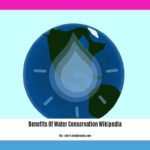Water conservation plays a pivotal role in the field of agriculture, offering a myriad of benefits that cannot be overstated. In this article, we delve into the ten key reasons why water conservation is of utmost importance in farming. From mitigating the effects of droughts to improving irrigation management, these reasons shed light on the crucial role water conservation plays in ensuring a sustainable future for agriculture. Join us as we explore the significant impact that efficient water usage strategies have on farm productivity and environmental resilience.

Key Takeaways:
- Going organic in farming methods can lead to higher crop yields, even during drought periods, and promotes healthy soil that retains water.
- Installing better watering systems, such as drip irrigation, can save up to 80% more water compared to conventional methods by delivering water directly to plant roots.
- Choosing drought-tolerant crops reduces water requirements and helps crops withstand water scarcity without sacrificing productivity.
- Storing rainwater through collection and storage systems provides a supplementary water source during dry periods.
- Optimizing watering times, such as irrigating during cooler periods, reduces evaporation and water loss.
- Improving soil quality with the right mix of organic materials and minerals enhances water retention, reducing overall water usage.
- Crop rotation helps reduce soil erosion, control pests and diseases, and improves soil water retention capacity, optimizing water usage and promoting sustainability.
- Conservation tillage techniques, which leave crop residues on the soil surface, minimize evaporation and preserve soil moisture.
- Water conservation in agriculture is crucial for minimizing water usage, mitigating water scarcity, and promoting ecological balance.
- By adopting effective water conservation strategies, farmers can ensure the sustainability of agriculture and preserve vital water resources.
Sources:
- Verdesian Life Sciences: Water Conservation in Agriculture
- Cropin: Water Conservation in Agriculture – Promoting Sustainable Farming
- SIGFOX: 8 Tips for Agricultural Water Conservation
- Mass.gov: Water Conservation for Agriculture
10 Importance of Water Conservation in Farming
Water conservation plays a crucial role in maintaining the sustainability of agriculture and preserving vital water resources. Implementing effective conservation strategies can help farmers minimize water usage, mitigate water scarcity, and promote ecological balance. In this article, we will explore the top 10 reasons why water conservation is so essential in farming and how it can be achieved.
1. Organic Farming Leads to Higher Crop Yields
One of the key strategies for water conservation in agriculture is going organic. Research has shown that organic farming methods can lead to higher crop yields, even during periods of drought. In fact, a 30-year trial found that organically-grown corn produced 30 percent more than non-organic fields when drought was taken into consideration. Organic farming practices also promote healthy soil, which helps retain water and supports stronger root growth.
2. Drip Irrigation Saves Water
Installing better watering systems is another crucial strategy for water conservation in agriculture. Techniques such as drip irrigation can help save up to 80 percent more water compared to conventional irrigation methods. By delivering water directly to the roots of plants, drip irrigation minimizes water loss due to evaporation and runoff.
3. Drought-Tolerant Crops Reduce Water Requirements
Choosing more drought-tolerant crops is another effective way to conserve water in agriculture. By selecting crops that are naturally adapted to arid conditions, farmers can reduce their water requirements. These crops are better equipped to withstand periods of water scarcity without sacrificing productivity.
4. Rainwater Harvesting Provides Supplementary Water Source
Storing rainwater is an essential strategy for water conservation in agriculture. By collecting and storing rainfall, farmers can have a supplementary water source during dry periods. Rainwater harvesting systems can range from simple techniques like collecting water in barrels or tanks to more complex systems that store water underground.
5. Optimized Watering Times Minimize Water Waste
Optimizing watering times is crucial for efficient water conservation. Irrigating crops during cooler, less windy periods can reduce evaporation and water loss. Additionally, practicing irrigation scheduling based on soil-plant or atmospheric conditions can ensure that water is used only when necessary, minimizing waste.
6. Improved Soil Quality Enhances Water Retention
Improving soil quality is another important aspect of water conservation in agriculture. Healthy soil with the right balance of organic materials and minerals has better water retention capabilities. This means that less water is needed for crop growth, reducing overall water usage.
7. Crop Rotation Optimizes Water Usage
Rotating crops is an effective strategy for sustainable water conservation. By alternating different crops in the same field over time, farmers can reduce soil erosion, control pests and diseases, and improve soil water retention capacity. This can help optimize water usage and promote long-term sustainability in agriculture.
8. Conservation Tillage Preserves Soil Moisture
Practicing conservation tillage is an important method for minimizing water loss. Traditional tillage practices can lead to increased evaporation of soil moisture. Conservation tillage techniques, on the other hand, leave crop residues on the soil surface, reducing evaporation and preserving soil moisture.
9. Integrated Pest Management Reduces Water Consumption
Implementing integrated pest management practices can also contribute to water conservation in agriculture. By using natural pest control methods instead of chemical pesticides, farmers can minimize water pollution from runoff and reduce the need for excessive watering to flush out chemicals.
10. Economic Benefits of Water Conservation
Apart from the ecological advantages, there are economic benefits to water conservation in farming. By reducing water usage, farmers can lower their operational costs, including energy expenses for pumping and irrigation. Water-saving techniques can also enhance the profitability of farms by minimizing losses due to water scarcity and drought.
In conclusion, water conservation is essential for the sustainability of agriculture and the preservation of vital water resources. By adopting effective conservation strategies such as going organic, installing better watering systems, choosing drought-tolerant crops, storing rainwater, optimizing watering times, improving soil quality, rotating crops, practicing conservation tillage, implementing integrated pest management, and reaping economic benefits, farmers can minimize water usage, mitigate water scarcity, and promote ecological balance in agriculture. Let us all play our part in conserving water for a more sustainable future.
Sources:
- Verdesian Life Sciences: Water Conservation in Agriculture
- Cropin: Water Conservation in Agriculture – Promoting Sustainable Farming
- SIGFOX: 8 Tips for Agricultural Water Conservation
- Mass.gov: Water Conservation for Agriculture
Transportation plays a vital role in Nigeria, ensuring the smooth movement of goods, people, and services. Discover the 10 importance of transportation in Nigeria by clicking here.
Transportation is not only crucial on a national scale but also on a global one. Explore how transportation impacts the world and its various aspects by clicking here.
A well-developed transportation system is the backbone of any thriving society. Dive into the 10 importance of transportation system and its impact on economic growth by clicking here.
Water conservation is a pressing matter in today’s world. Unveil the 10 importance of water conservation and how it influences our environment by clicking here.
Students hold the power to shape the future. Empower yourself by understanding the 10 importance of water conservation for students and how your contribution can make a difference. Click here to learn more.
Efficient Water Management Decreases Production Costs for Farmers
Proper water management is not only essential for the success and sustainability of agricultural operations, but it also plays a crucial role in decreasing production costs for farmers. By adopting efficient water management practices, farmers can optimize water usage, reduce wastage, and ultimately save money. Let’s delve into the key reasons why efficient water management decreases production costs for farmers.
1. Enhanced Irrigation Techniques
Efficient water management involves implementing advanced irrigation techniques that minimize water wastage and maximize crop hydration. For example, drip irrigation saves up to 80% more water compared to conventional methods by delivering water directly to the plant’s roots. This method ensures that water is used more effectively, reducing water and energy expenses for farmers.
2. Reduced Water Requirements
By choosing drought-tolerant crops, farmers can significantly reduce their water requirements. These crops have adapted to survive with less water, making them more sustainable and cost-effective to cultivate. With improved water management, farmers can plant these crops strategically, lowering their overall water consumption and production costs.
3. Efficient Water Distribution
Efficient water management is also crucial for proper water distribution. By optimizing watering times, farmers can minimize evaporation and prevent water waste. Implementing smart irrigation systems that use sensors and weather data to adjust water application can help ensure that crops receive the right amount of water at the right time. This results in higher water efficiency and reduced costs for farmers.
4. Soil Health and Water Retention
Improving soil quality through water management practices enhances water retention capacity. Healthy soils can effectively retain moisture, reducing the need for excessive irrigation. Conservation tillage techniques, crop rotation, and organic farming practices all contribute to soil health and increase water efficiency. By implementing these practices, farmers can save on irrigation costs while supporting sustainable agriculture.
5. Lower Operational Costs
Efficient water management significantly lowers operational costs for farmers. By reducing water usage and optimizing irrigation practices, farmers can decrease expenses related to water supply, pumping, and maintenance. These cost savings contribute to improved profitability and financial stability for farmers.
6. Preservation of Water Resources
Efficient water management helps preserve water resources, ensuring their availability for future agricultural needs. As water scarcity becomes a global concern, optimizing water usage through sustainable practices becomes even more crucial. By conserving water and using it judiciously, farmers contribute to a sustainable water supply, reducing the risk of water shortages and subsequent price fluctuations.
Key Takeaways:
- Efficient water management techniques such as drip irrigation and drought-tolerant crop cultivation significantly reduce water usage and production costs for farmers.
- Optimizing watering times, improving soil health, and implementing smart irrigation systems contribute to water efficiency, resulting in cost savings.
- Lower operational costs and water preservation through efficient water management enhance profitability and support sustainable agriculture practices.
References:
– Efficient water management: an analysis for the agricultural
– Sustainable Water Management in Agriculture under Climate Change
Water Conservation in Farming: Mitigating the Impacts of Droughts
Global agricultural practices play a vital role in water conservation efforts by mitigating the impacts of droughts. As the world faces increasing water scarcity, it becomes crucial to understand the significant role that water conservation in farming plays in preserving this precious resource. By adopting sustainable water-saving practices, farmers can not only protect their livelihoods but also contribute to the long-term health of our ecosystems.
Understanding the Importance
Droughts can have devastating impacts on agriculture, leading to reduced crop yields and compromising food security. The research has shown that farmers can play a pivotal role in minimizing these impacts through water conservation efforts. Utilizing voluntary water restrictions and collaborative water resource management can significantly reduce the strain on aquatic ecosystems and protect vulnerable crops from water stress.
It is important to note that agriculture currently accounts for a staggering 70% of global freshwater withdrawals. This highlights the urgent need to prioritize water conservation in farming practices. By adopting efficient irrigation management techniques, farmers can optimize water usage and minimize waste.
Mitigating the Impact
Farming practices centered around water conservation can effectively mitigate the impact of droughts. Initiatives such as watershed management and the implementation of efficient water usage strategies are key components of successful conservation farming. Integrating soils information and land management further enhances the conservation efforts and ensures the optimal utilization of resources.
During droughts, farmers often resort to pumping water from aquifers, even at higher costs or reduced yields. However, by prioritizing water conservation, farmers can reduce their reliance on this practice, preserving surface water and maintaining its availability for other essential needs.
The Social and Economic Impacts
Droughts have profound social and economic implications, particularly on agriculture. Developing countries, where the agricultural sector is prominent, bear the brunt of this impact, absorbing up to 80% of the consequences. As such, efficient water management practices can greatly alleviate these pressures and safeguard the economic stability of farming communities.
Key Takeaways:
- Water conservation in farming plays a crucial role in mitigating the impacts of droughts on agricultural productivity and food security.
- Farmers can reduce the strain on aquatic ecosystems by implementing voluntary water restrictions and collaborative water resource management.
- By adopting efficient irrigation management techniques, farmers can optimize water usage and minimize waste.
- Conservation farming practices, such as watershed management and efficient water usage strategies, contribute to mitigating the impact of droughts.
- Incorporating soils information and land management enhances water conservation efforts.
- Farmers can reduce their reliance on pumping water from aquifers during droughts by prioritizing water conservation.
- Droughts have significant social and economic impacts on agriculture, particularly in developing countries.
- Efficient water management practices in farming can help alleviate these social and economic challenges.
Sources:
– ResearchGate: Drought Impacts in Agriculture: Water Conservation
– Springer: Drought Impacts in Agriculture: Water Conservation and Water Saving Practices
Conserving Water in Agriculture Supports Sustainable Farming Practices
Water conservation in agriculture is not just important, it is essential for promoting sustainable farming practices. The agriculture sector is one of the largest consumers of water globally, and with growing concerns about water scarcity, it is crucial that farmers adopt practices to conserve water and ensure its efficient use.
Top 10 Practices for Water Conservation in Agriculture
Planting Cover Crops: By planting cover crops during the gaps between seasonal plantings of the main crops, farmers can reduce water runoff, control erosion, and improve soil health.
Dryland Farming: Farming in arid or semi-arid regions can be challenging, but adopting dryland farming techniques can help. This involves conserving soil moisture, using drought-tolerant crops, and adopting soil conservation practices to minimize water loss.
Drip Irrigation: Drip irrigation is one of the most efficient methods of irrigating crops. It delivers water directly to the plant’s roots, reducing water waste through evaporation or runoff.
Collect & Store Water: Implementing water harvesting systems can help farmers collect and store rainwater for future irrigation needs. This reduces reliance on scarce water sources and promotes sustainable water use.
Cleaning & Recycling Water: Recycling and reusing water in agricultural operations can significantly reduce water consumption. Implementing water treatment systems and using treated wastewater for non-potable purposes can conserve water resources.
Two-Layer Farming: Two-layer farming involves growing different types of crops on the same plot of land to maximize water and nutrient utilization. This integrated approach promotes efficient water management and increases agricultural productivity.
Native and Drought-Tolerant Plants: Growing native plants and crops that are adapted to the local environment can minimize water requirements. These plants have evolved to withstand drought conditions, reducing the need for excessive irrigation.
Crop Rotation: Crop rotation is a practice where different crops are grown in sequence on the same piece of land. This helps to improve soil health, reduce pests and diseases, and optimize water use efficiency in agriculture.
Efficient Irrigation Scheduling: Implementing smart irrigation systems that are based on real-time weather conditions and soil moisture levels can optimize water use. This prevents over- or under-irrigation and ensures that crops receive adequate water while minimizing water waste.
Organic Farming: Organic farming practices prioritize soil health and reduce the need for synthetic inputs. This promotes efficient water infiltration and retention in the soil, leading to improved water use efficiency.
By adopting these top 10 practices for water conservation in agriculture, farmers can contribute to sustainable farming and mitigate the impact of water scarcity. These practices not only ensure efficient water use but also promote soil health, biodiversity, and long-term agricultural sustainability.
Sources:
- Organic India USA – Top 10 Practices for Water Conservation in Agriculture
- Green.Earth – Drip Irrigation
Key Takeaways:
- Water conservation in agriculture is crucial for promoting sustainability and minimizing stress on water systems.
- Farmers can implement various practices to conserve water and ensure efficient water use, such as planting cover crops and adopting drip irrigation.
- Collecting and storing water, cleaning and recycling water, and practicing two-layer farming are additional methods to conserve water in agriculture.
- Growing native and drought-tolerant crops, implementing efficient irrigation scheduling, and practicing organic farming also contribute to water conservation in agriculture.
- By adopting these practices, farmers can contribute to sustainable farming, promote soil health, and mitigate the impact of water scarcity.

FAQ
Q1: Why is water conservation important in farming?
A1: Water conservation is important in farming for several reasons. It helps minimize water usage, mitigate water scarcity, and promote ecological balance in agriculture. Additionally, efficient water management practices can lead to increased crop yields, improved soil health, and reduced environmental impacts.
Q2: What are some strategies for water conservation in agriculture?
A2: There are several strategies for water conservation in agriculture, including going organic, installing better watering systems like drip irrigation, choosing drought-tolerant crops, storing rainwater, optimizing watering times, improving soil quality, rotating crops, and practicing conservation tillage. These strategies aim to reduce water waste, improve water retention, and enhance overall water use efficiency in farming.
Q3: How does organic farming contribute to water conservation in agriculture?
A3: Organic farming practices promote water conservation by focusing on soil health. Healthy soil with the right balance of organic materials and minerals has better water retention capabilities, reducing the need for excessive irrigation. Organic farming also helps minimize water pollution by avoiding the use of synthetic inputs that could potentially contaminate water sources.
Q4: How does drip irrigation help in water conservation?
A4: Drip irrigation is an efficient method of irrigating crops that delivers water directly to the roots of plants. This reduces water waste through evaporation and runoff, as water is only applied where it is needed. Drip irrigation can save up to 80 percent more water compared to conventional irrigation methods, making it a valuable strategy for water conservation in agriculture.
Q5: What are the benefits of storing rainwater in agriculture?
A5: Storing rainwater in agriculture has several benefits for water conservation. It provides farmers with a supplementary water source during dry periods, reducing reliance on scarce water resources. Rainwater harvesting can range from simple techniques like collecting water in barrels or tanks to more complex systems that store water underground. By capturing and storing rainfall, farmers can better manage water availability and promote sustainable water use in farming.
- Unlocking Francis Alexander Shields’ Finance Empire: A Comprehensive Biography - July 12, 2025
- Unveiling Francis Alexander Shields: A Business Legacy - July 12, 2025
- Francis Alexander Shields’ Business Career: A Comprehensive Overview - July 12, 2025















